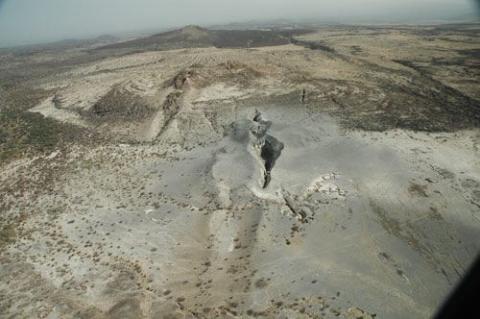Hole in the Earth: Giant crack that formed in Africa that will become an ocean

International Business Times - Hole in the Earth: Giant crack that formed in Africa that will become an ocean
By Sean Martin | International Business Times
In 2005, a giant 35-mile-long crack opened up in the Afar desert of Ethiopia in just a matter of days. Theories began to spread quickly that the massive crack, which is 20ft wide at some points, was the beginning of the formation of a new ocean. The philosophy of this was deemed controversial until a team of scientists conducted extensive research on the area and were able to confirm it.
The 2009 study published in the Geophysical Research Letters found the process that occurred when the hole was being developed was essentially identical to what has happened at the bottom of our oceans, and is the same phenomena that is responsible for the slow separation of the Red Sea.
Cindy Ebinger, professor of earth and environmental sciences at the University of Rochester and co-author of the study, said: "We know that seafloor ridges are created by a similar intrusion of magma into a rift, but we never knew that a huge length of the ridge could break open at once like this."
The researchers discovered that the massive rift would be responsible for a future ocean by using seismic data from the area in 2005. They found an eruption at the Dabbahu volcano – at the top of the crack – erupted and caused the process downwards, much like the Earth was unzipping. This led them to the conclusion that the volcanic boundaries situated along the tectonic ocean plates may split in large chunks along the rift.
The African plates meet the Arabian ones in the Afar desert and have been separating at a speed of 1in per year for the past 30 million years, and is responsible for the Red Sea. The researchers believe that eventually, when the crack is big enough, the Red Sea will pour into the new area, and create an ocean in the Gulf of Aden.
Ebinger added: "The whole point of this study is to learn whether what is happening in Ethiopia is like what is happening at the bottom of the ocean where it's almost impossible for us to go. We knew that if we could establish that, then Ethiopia would essentially be a unique and superb ocean-ridge laboratory for us. Because of the unprecedented cross-border collaboration behind this research, we now know that the answer is yes, it is analogous."
However, a new ocean will not appear immediately and the researchers state that it is a process that will take up to a million years.
Source: IB Times
